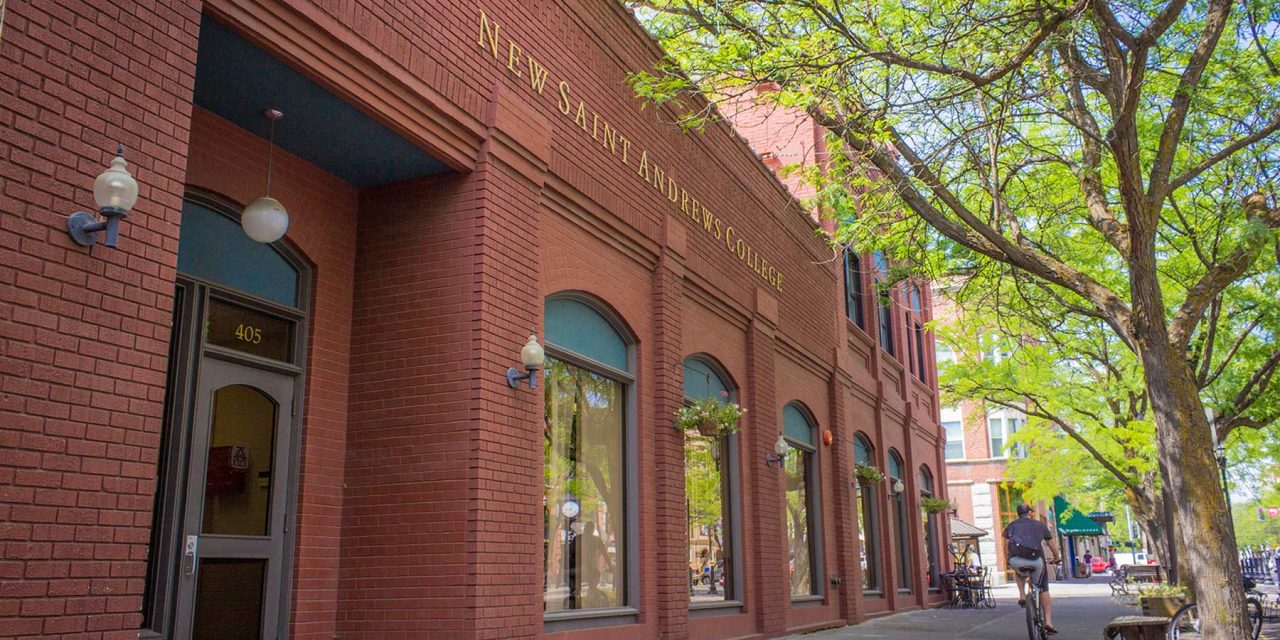“EVERYONE WANTS THE APPLES;
VERY FEW WANT TO PLANT THE TREE AND WAIT.”
THE SMALL BEGINNINGS OF A CLASSICAL CHRISTIAN COLLEGE
A Christian college started in my family’s dining room. True story. But as exciting as that might sound when I say it now, at the time it looked to me (the teenager tiptoeing down the stairs to avoid disturbing a class discussion) like exactly what it was: nothing much.
And by nothing much, I mean that it was just a handful of young people sitting with open books and pens in hand while my dad oversaw a discussion of some classic text.
Any number of study groups around the country would have looked almost the same. In fact, in our university town, that first-ever college class probably looked a lot less impressive than many bigger and more sophisticated study groups happening just down the road.
The entire student body consisted of four young people. The entire faculty consisted of volunteers with day jobs. My own father was a university professor and administrator giving up his free time and our dining space for something that might very well go nowhere. Yes, there were plans and prayers for bigger and better things. But nobody knew exactly how, or how slowly, that might happen.
There was no college building. There was not so much as a lecture hall. Homes and office spaces had to suffice. !ere was no impressive library, no list of majors, no endowment, no athletics program, no alumni association, and, come to think of it, no alumni. There were no paid employees—just a collection of leaders with graduate degrees, a love for Christ, and a vision for classical Christian higher education. And that First handful of students had to be just gutsy (or just crazy) enough to be the first ones to enroll in a tiny college without a past and without a clear future.
Small beginnings. It’s easy to despise them. It’s easy to roll our eyes at ordinary people with “high, apple-pie-in-the-sky hopes.” We’ve all seen startups fail. We’ve all seen new institutions struggle. We’ve all met the wild-eyed dreamer with completely unrealistic goals. Not every plan succeeds, and it’s the potential for failure that makes the risk takers seem just a little nuts.
But even when these new institutions manage to not struggle or fail, our instant-gratification culture has a hard time taking the long-term view. Everyone wants the apples; very few want to plant the tree and wait. But planting and waiting is very much what Christians, of all people, should be about. After all, didn’t somebody, somewhere say something about the kingdom of God growing like a mustard seed?
It’s easy to dismiss that pitiful mustard seed as a scrap of nothing much. It’s easy to forget that a single match can light up an entire room—and set the world on fire. It’s easy to look at the muddy creek meandering along the backroads and doubt that it could ever wind its way toward the mighty rivers that rush into the sea. But every great endeavor must begin somewhere—usually somewhere quite small. Somewhere like, say, a family dining room in rural Idaho.
It’s not that the college that started in our dining room has now become the next Oxford or Princeton in the mere quarter-century since the first class met at our family table. But its graduates have since gone on to earn graduate degrees at Oxford and Princeton. Its alumni are now doctors and lawyers and teachers and writers and pastors and mothers and fathers—and the kind of faithful seed-planters with the plans and the patience to wait for them to grow.
New Saint Andrews College has not be- come the biggest university or the most decorated institution of higher learning in the land. It’s still young. It’s still small and quirky and hard to find on a map. In fact, I think it’s safe to say that it’s still in its day of small beginnings. But like so many schools in the classical Christian movement, it has grown. And built. And born fruit. And grown some more. And if the past few years of growth are any indication, it will continue to bear a great deal more fruit in the years to come.
Small beginnings. Do not despise them. What a privilege it is to witness the ground- breaking work of those who dared to plant, the slow and patient work of those who came to water, and the kind and faithful work of God himself, who has given the increase. Soli Deo gloria. ✤
“D O N O T D E S P I S E T H E S E
SMALL BEGINNINGS,
F O R T H E L O R D
R E J O I C E S T O S E E
THE WORK BEGIN.“
(ZECHARIAH 4:10)
 HANNAH K. GRIESER is an ACCS alumna and the mother of 5 sons, including one cancer survivor. She lives in northern Idaho where, in addition to managing her family’s full schedule, she works as a writer and graphic designer. She is the author of numerous articles and of the book The Clouds Ye So Much Dread (Canon Press, 2017).
HANNAH K. GRIESER is an ACCS alumna and the mother of 5 sons, including one cancer survivor. She lives in northern Idaho where, in addition to managing her family’s full schedule, she works as a writer and graphic designer. She is the author of numerous articles and of the book The Clouds Ye So Much Dread (Canon Press, 2017).












